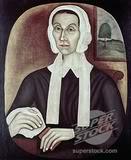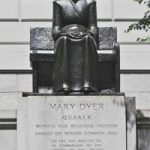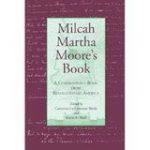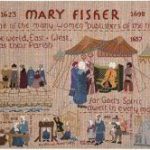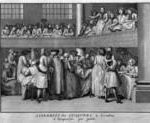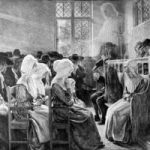Women in Religion: Female Quaker Preacher
Quaker writer and speaker Bathsheba Bowers wrote a spiritual autobiography, An Alarm Sounded to Prepare the Inhabitants of the World to Meet the Lord in the Way of His Judgments (1709), one of the first published religious testimonials by an Anglo-American woman. In a biographical sketch of Bowers written in 1879, William J. Potts referred to other works written by her, but none of these has come to light in scholarly research, and her reputation accordingly rests solely on her spiritual autobiography.
Raised in Charlestown, Massachusetts, Bowers was one of twelve children born to Benanuel Bowers and Elizabeth Dunster Bowers, English Quakers who had settled in America. When the Puritan persecution of Quakers became intolerable in the late seventeenth century, her parents sent Bowers and three of her sisters to live in Philadelphia, a city known for its liberality and its large Quaker population.
In Philadelphia, Bowers attended Quaker meetings, and built a small house with a garden at the corner of Little Dock and Second Streets. But she gradually isolated herself from the community, apparently preferring to spend time at home rather than with her neighbors. Furnishing her home with books, a table, and little else, Bathsheba became a gardener and a vegetarian.
What little biographical information that exists about Bowers, in addition to what she revealed in her book, appeared in a diary kept by Bowers’ niece Ann Bolton, who wrote that after Bowers “had finished her house and garden, and they were as beautiful as her hands could make them, or heart could wish, she retired herself in them free from Society as if she had lived in a Cave under Ground or on the top of a high mountain.” The locals regarded her as an eccentric and referred to her garden as Bathsheba’s Bower and Bathsheba’s Folly.
Quakers believed that an individual’s physical drives and human needs too often supplanted the spiritual relation that he or she enjoyed with God. Although Bowers understood the necessity of overcoming what she viewed as her sins of ambition and pride, she was a strong-willed woman who did not easily transform herself into a Quaker.
But Bathsheba Bowers eventually became a Quaker preacher. In 1707, when she was thirty-five years old, she moved from Pennsylvania to South Carolina, probably to spread the Quaker faith and to join the growing community of Friends there.
Praising Bowers’ resolute faith in God when she was faced with an Indian attack after moving to South Carolina, Ann Bolton nonetheless criticized what she regarded as her aunt’s odd religious faith. In fact, Bolton wrote that Bowers’ religious ideas were so strange that they hardly qualified as those of a Quaker.
Although Bowers’ writing joined an established tradition of Quaker journals being written during her time by women in England, An Alarm Sounded to Prepare the Inhabitants of the World to Meet the Lord in the Way of His Judgments, published in 1709, added an American dimension to this highly personal genre. It was not uncommon for English Quakers, men and women, to publish their journals, but in the early eighteenth century American women did not commonly publish their writings.
Courageously defying contemporary norms, Bowers expected criticism for publishing her chronicle, and she confronted her readers with her rationale for doing so. This strong and individualistic woman almost defied the reader to disagree with her God-inspired feeling that she was led to share the story of her religious trials with the world.
Most likely published in New York by fellow Philadelphian and Quaker William Bradford (no relation to the Puritan William Bradford), who ran a prosperous printing business, An Alarm Sounded to Prepare the Inhabitants of the World to Meet the Lord in the Way of His Judgments is a twenty-three page narrative that relates Bowers’ struggle to achieve and maintain a mystical union with God, a relationship Quakers believed was available to all who overcame human drives and passively awaited God’s sign.
Like other early Quaker writings, such as those of John Woolman and Elizabeth Ashbridge, Bowers’ narrative documents her afflictions and anxieties about her faith as well as her lifelong battle to understand why God had subjected her to perpetual misery. She agonized particularly over publicly speaking about her religious life, an obligation that most Quakers assumed to some degree.
Only in a few rare moments did Bowers attain any semblance of inner peace. Instead, this written account of her life chronicles the depth of her spiritual questionings. Whereas most colonial women’s diaries provide a glimpse of what daily life was like for an early American woman, Bowers’ work presents an intimate look at a woman’s religious zeal. Though records exist today for only a single volume, Bowers is said to have written a number of books.
Remaining single throughout her life, Bowers lived in South Carolina until her death in 1718, at the age of forty-six.
